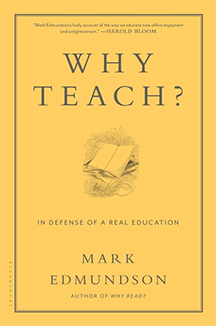By Doug Phillips
In time for a fresh semester comes Mark Edmundson’s Why Teach? In Defense of a Real Education, a smart collection of occasional pieces and provocative essays, many of them first published in venues such as Harper’s, The Chronicle of Higher Education, and The New York Times, and all of them in some way concerned with education—or rather, a real education—about which Edmundson remains a passionate and public voice.
To understand just what Edmundson means by a “real education” is to know something about the capital-r Romantics who, for more than a quarter century, have featured regularly in his lit courses at the University of Virginia, and who, by the evidence of Why Teach?, inform his scholarship while fueling his own revolutionary spirit. One feels, for example, the force of Shelley at the close of Edmundson’s troop-rallying introduction:
“I’d like us to blow a hole through the university’s ethos of entertainment and training for success and to bury its wearisome work-hard, play-hard frat-boy ideology. We should blast away the customer-coddling deans and student service hacks…Blast university presidents so afraid of offending a potential donor that they won’t raise a word in behalf of social justice or political sanity. Blow away the trustees who think that they’re a corporate board of directors and will not rest until their schools resemble Walmarts. Blast them all.”
Until, that is, his Shelleyan insistency warms into a kind of tempered ease and balanced act that characterizes his best writing:
“And while you’re doing it, have a good time. Because knowledge is joy. Creativity is ultimate freedom. Real thought is bliss…Dare to Know; Dare to Be Wise!”
But where, one wonders, is a real education—which is to say, wisdom—to be found? Toward answering this Jobian question is what Why Teach? is all about, and Edmundson will invoke the spirit of a good many other Romantics along the way to help make his case.
Wisdom, suggests Edmundson, may be successfully sought and taught at the university, but only to the extent that both seeker and teacher are able to resist the notion of education as an easy-to-swallow sweetbite between keggers and social-climbing. Without this resistance, much of university life today is but a rehearsal of Wordsworth’s “getting and spending,” a laying waste of powers in preparation for a life of dull conformity and unhappy consumerism, something Edmundson presciently diagnosed nearly twenty years ago in a piece for Harper’s called “Liberal Arts & Lite Entertainment,” now the new book’s lead-off essay. “University culture, like American culture writ large,” he writes, “is, to put it crudely, ever more devoted to consumption and entertainment, to the using and using up of goods and images.” Edmundson, though, is well-aware of his own complicity in wanting to play it cool (a point he’ll address in a later essay titled “The Uncoolness of Good Teachers”), to step at least occasionally into the frame of “goods and images,” if not for the sake of those pesky end-of-the-semester evaluations then for sake of what David Foster Wallace somewhere described as the need to be “maximally likeable.” We live, after all, in the age of Facebook where the pursuit of being “liked” is not only a means to shoring up one’s ego, but a late capitalistic way of life. Professors seeking tenure and promotion are as conditioned to this fact as the students whom they presume to teach. And yet if that is the culture as-is, then the point of real learning has everything to do with real alternatives, with what Edmundson, drawing upon Emerson (the high priest of American Romanticism and Edmundson’s hero), calls second chances.
Edmundson makes plain—early and throughout Why Teach?—that the principal value of a liberal arts education (and a literary education in particular) is a chance to revise who we are, an opportunity to understand and experience life differently, to open up new vistas and other ways of seeing, to experience, in the words of Keats, Soul-making. In a wonderfully persuasive plug for the field titled simply “The English Major,” Edmundson posits that such a person “reads because as rich as the one life he has may be, one life is not enough. He reads not to see the world through the eyes of other people but effectively to become other people….to the English major the questions of life are never closed. There’s always another book to read; there’s always another perspective to add.” If a better argument has been made on the subject, I have yet to find it.
Essay collections are a bit like old record albums. Among the hits there will be the usual smattering of B-sides, listenable perhaps but not in league with the A’s. In Why Teach?, the one or two B-sides I encountered are those that feel dated, less in the groove of what’s going on now or down the hall from where I myself teach. When for example Edmundson argues in “Against Readings” (a piece I’m pretty sure is drawn from his mid-nineties, university press imprimatur: Literature Against Philosophy, Plato to Derrida) that theoretical meat-grindings in the form of Deconstruction, Marxism, New Historicism, Feminism, Psychoanalysis, et al., blunt our appreciation for whatever news a literary work might offer about Life, I take his point, though I’m not convinced these practices are quite so widespread as his essay would have us believe. Not long ago a “lens”-based approach to reading, say, Frankenstein may have been all the rage, but not so much anymore.
My guess is that far more teachers than Edmundson seems to allow have come around to his way of doing things, to having been shaped and influenced and bettered by his tireless push for more meaningful teaching, and to focusing on the fundamental question that he insists is crucial to any worthwhile reading experience, which is: Can you live it?
Doug Phillips teaches English and American literature at the University of St. Thomas in St. Paul, Minnesota.




